
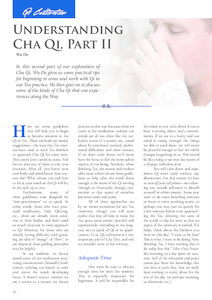 |
|
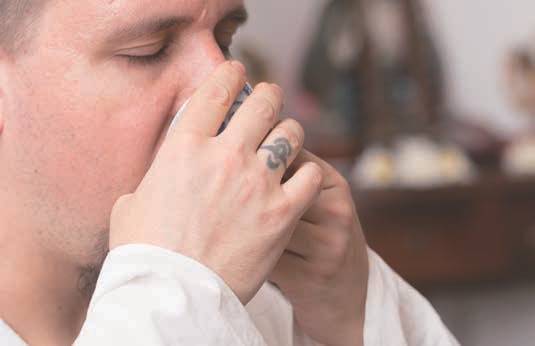
Here are some guidelines that will help you to begin to become sensitive to the Qi in Tea. These methods are merely suggestions - the ways that Tea veterans have used to teach Tea drinkers to approach Cha Qi for some time. They aren't laws carved in stone. Feel free to alter any of them to suit your situation. After all, you know your own body and mind better than anyone else! What relaxes you and how to focus your mind on the Qi will be, in the end, up to you.
Furthermore, many of these guidelines were designed for "non-practitioners" so to speak. In other words, those who have practiced meditation, Taiji, QiGong, etc., often are already more sensitive to their bodies and don't need so much structure in their approach to Qi. However, for those who are already having difficulty with grasping the idea of "energy" or "flow", or are skeptical, these guiding principles may be helpful.
In our tradition, we always spend some of our meditation practicing concentration (Samadhi) meditation, utilizing our breath to calm and center the mind, developing focus. It doesn't matter whether we are a novice or a master, we always practice in this way, because when we come to the meditation cushion our minds are all too often like the turbulent waves of a stormy sea, tossed about by emotional turmoil, professional difficulties and other stresses. If we don't calm down, we'll never have the focus to feel the more subtle aspects of our being. Similarly, when drinking Tea, the master and student alike must utilize certain loose guidelines to help calm the mind down enough to be aware of the Qi moving through us. Eventually, though, connection to that aspect of ourselves becomes easier and easier.
All of these approaches are by no means necessities for any Tea ceremony, though you will soon realize that they all help to make the Tea space more serene, peaceful and experientially rewarding in the longrun, not to speak of Qi or its appreciation. To us, Qi cultivation is a very important part of Cha Dao, and one we wouldn't want to live without.
One must be sure to allocate enough time for one's Tea sessions. This is especially important for beginners. It will be impossible for the mind to ever calm down if one is busy worrying about one's commitments. If we are in a hurry, and our mind is racing through the things we did or need done, we will never be peaceful enough to feel the subtle changes happening in us. This would be like trying to see into the waters of a choppy, turbulent river.
You will calm down and experience Qi more easily without any distractions. For that reason, it's best to turn off your cell phone - not allowing any outside influence to disturb yourself or others present. Some may want to do some breathing exercises or listen to some soothing music, or perhaps you may just sit quietly for a few minutes before even approaching the Tea, allowing the cares of the world to slip far away so that no aspect of the ceremony is rushed. If it helps, think about the freedom you have on this day: "I want to be here! This is what I want to be doing Now, drinking Tea. I have nothing else to do today but this." Like a lazy Saturday morning, or a day spent on vacation, half of the relaxation and peace comes just from the knowledge that our time is truly free, that we really have nothing to worry about for the rest of the day (or perhaps morning, or afternoon, etc.)
Traditionally, most Tea rooms were always decorated in a simple yet elegant way. The light should be soft and dim, and the room should be quiet. It is also better if one's Tea space is properly ventilated and comfortable. Decorations that inspire relaxation, like bonsai trees, flowers or some nice calligraphy are often preferable. While many masters gravitate towards simplicity in teaware, as well as décor, it is only really important that the teaware doesn't distract from the experience of the Tea itself.
A nice chaxi (tea stage) is a great way to enhance the session, and celebrate the 'one encounter, one chance' we have to meet Here and Now. Flowers, sacred objects, candles, beautiful objects from nature (rocks, wood, etc.) - all help to fill the space with a calming energy that increases our sensitivity to Qi. You needn't spend any money to make a great chaxi; it's more about the heart you put into the occasion.
The ambiance should have an overall sense of serenity. The best Tea houses or Tea spaces make one feel peaceful and calm almost right away; and the more untroubled the body and mind are, the easier it will be to recognize the subtle sensations in the body.
It often helps to wear loose-fitting and comfortable clothes. Our house clothes often help us to relax just by association. Being comfortable is paramount if one is to relax; and like we said, focusing on things like having enough time to fully enjoy the Tea, doing so in a peaceful environment and wearing comfortable clothes - all of these make the Tea session so much more enjoyable, besides helping create an environment more conducive to experiences of Qi, transcendence or Dao.
Perhaps the most important aspect of learning to feel Qi is that the Tea session include some quiet. Our minds are at times a tempest of thoughts, doubts and worries, and we may come to the Tea space with all kinds of stress and turmoil. No matter whether you view Tea as a Dao, a hobby or a beverage, all Tea drinkers have in common that they wish to find a little relaxation, peace and quiet - some time away from the stresses of ordinary life. For that reason, almost any Tea session is improved by some quietude.
Of course, sometimes Tea is social and we use Tea to bring comfort to friends and help make light of each other's company, but most Tea drinkers we know (besides those doing business in Tea) will testify that such social occasions represent the smallest portion of their Tea drinking. Most of our daily Tea is just us and our Leaf, and as such - if it is ever to be a Dao - quietude is paramount.
Chatting only stimulates the mind to focus on external events, rather than concentrating on the body, the Qi and the Tea. We have yet to meet the person that can fully experience their body, taste buds, olfactory sensations, etc. and carry on a conversation at the same time. We can't pay attention to the Tea and talk about outside topics at the same time; it just isn't possible. Talking only carries us away from the moment. And we would say this goes for note-taking too. One may wish to write down some of one's experience, but the more energy one devotes to this internal dialogue going on, the less one is present to the moment and sensations at hand. It seems odd that we wish to talk to ourselves, or to some future listener/reader rather than being in the space that the Tea is creating.
Try to find a way to be comfortable with silence. It may help to close your eyes as much as possible during the session, which guides the attention inward, towards the sensations in the body, stopping our natural tendency towards distraction.
Eventually, you will even begin to crave the quiet. We have seen so many ordinarily loquacious individuals (including myself ), no mater how talkative and uncomfortable with silence - especially when it is in public - who were comfortably silenced for hours at a time by drinking great teas.
External quietude reminds us of the Stillness in our hearts, allowing us to rest in that space. Over time, we develop the ability to be still even in noise. Still, Tea rewards quietude. Sometimes when someone is quiet, they notice new things in a Tea they have been drinking daily for a long time. By approaching the Tea with focus, new dimensions are opened up, and they are often very healthy and blissful as well.
By starting Tea sessions with some quiet, if you then decide to move into a conversation, you will find that it comes from the heart. Then, you find yourself talking about things that matter.
You may find that some peaceful music, usually without lyrics, also helps to inspire your guests to turn inwards, relating to the Tea, themselves and the space in a different way. Tea and music have been paired for millennia, and work well together in harmony. Finding the right music for Tea is also a great joy!
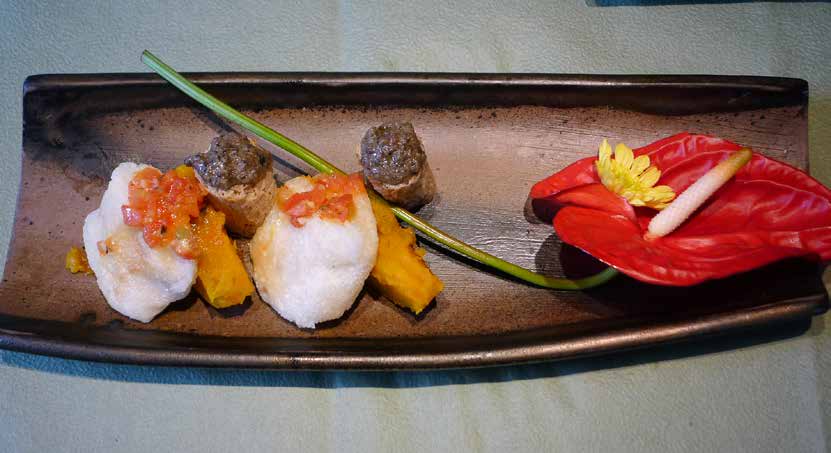
We must remember that Cha Dao is a lot more than just being peaceful when we are in our Tea rooms, enjoying ourselves. Having had profoundly serene experiences, it would be impossible for one to then walk out of that room and live the rest of one's life in unhealthy ways; for in essence the one who wasn't transformed by an experience of transcendence as such couldn't have had a very deep one.
Once a person truly experiences the harmony of a life lived naturally, healthy and with the Dao, living otherwise becomes all that much more uncomfortable now that she is hyper-sensitive of the subtle differences in her being, caused by things like diet, environment, stress, etc.
The more subtle our minds become, the more we realize the simple truth that we are what we eat, as much as what we drink, and so much of our connection to Tea comes through the very fact that it is "consumed", combining with and becoming a part of us. We are becoming the Tea, as we drink it, and it is also becoming us. The same is true for what we eat.
There is a very good reason why meditators have always promoted a healthy, light vegetarian diet. Eating meat is grosser, heavier and dulls the senses. When we eat large meals with lots of meat, we feel sleepy, dull and unaware. Tea masters have also found that it is far more difficult to become sensitive to our bodies and approach Qi when we have eaten such heavy foods. Beyond just meat, one cannot expect to be sensitive of one's body if one is consistently eating junk food. If one's connection to their body is dull enough to be unaware of the affects such garbage is having on their being, how can one hope at all to approach the even more subtle aspects of existence?
Many times, we will eat a light snack before the Tea session. It is best to approach the Tea with neither an empty nor a full stomach. Drinking Tea on an empty stomach might make one feel some slight discomfort, and a full stomach dulls one's ability to taste, smell and of course feel the sensations caused by the Qi. A clear sense of one's body overall is a great place to start from. Even if you aren't vegetarian, it may be useful to eat only veggies before Tea ceremonies, allowing for a lighter, more sensitive body that encourages the experience of Qi.

Generally, Cha Qi will manifest in one of several overall patterns. Each session, however, will have slight variations, even if the same Tea is drunk twice. Of course, every moment is bright and new as we bring to each Tea session a different body and mind.
Tea and Qi are, after all, not just a cup of liquor, but also the interaction of that liquor with a human being, and both are constantly changing. Every single ceremony will be different from all the others before - the one brewing and even the leaves themselves will have changed too, even if it is only a week later. Here are some overall patterns in the way Cha Qi manifests itself:
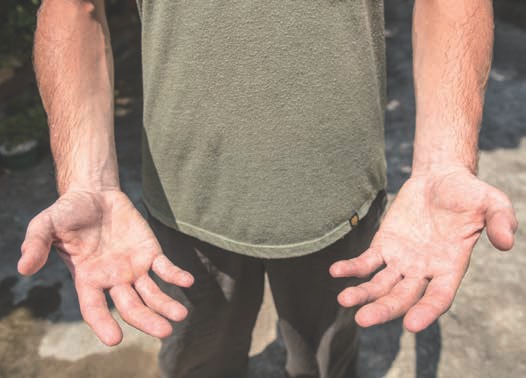
In looking at the traditional symbol for Yin and Yang as it has been represented for so long, one can see that both the white Yang and black Yin contain a seed of the other within them, which is to say that they are interdependent and cannot arise without the other. In other words, there is no pure Yin energy, as it will always have elements of its counterpart. Yin represents darkness, passivity and femininity; it refers to the deeper, accepting, introverted nature of things - the movement inward, subtle and gentle; the dying and ending of all things. The Daoist novel from the Song Dynasty, Seven Daoist Masters, translated eloquently by Eva Wong, speaks about the more spiritual side of these energies thus: "Yang is the clear, conceptualizing intelligence; Yin is the receptive, intuiting quietude."
This kind of Qi makes one's mind calm and generates a peaceful, light feeling. It is elegant and often results in a cottony inner rhythm. The gentleness can increase gradually, but even when perception is consumed by it, this kind of Qi remains feathery and light. It is soft and comfortable. Usually, Yin energy is deeper and more consuming, as well as longer lasting than its counterpart. Yin energy takes much longer to gather strength, like water ever so slowly pouring downward, but once it does become great, it will be more powerful and enduring than Yang energy.
Yang refers to the masculine, outward opening of energy. It is the birth, the creativity and flourishing of outward motion. This energy is brisk and quick, arising fiercely and passionately, but ultimately burning out into blackness. It is the daytime sun and growth of living things.
This stronger kind of Cha Qi often hits one after the first sip, or smell even. Some teas will cause Qi to rise right to the top of the head after the first taste, causing a numb feeling similar to that felt just before fainting. This type of Qi often causes grosser sensations like perspiration, heat or a quickened pulse. However, after these pass and blockages are cleared, one is usually left with an overall sense of comfort. We have found that the stronger, Yang Qi tends to follow two general patterns: One is lower in density, causing a sensation that feels almost as if there are gaps between the atoms of the body. The movement or pulsing is slower with more space between the so-called "wavelengths" of the vibrations in the body. The second variety moves more rapidly and feels like a strong current of too many small particles to really distinguish any one. This kind of Qi is higher in density and often merges the whole body into a mass of waves that are vibrating briskly.
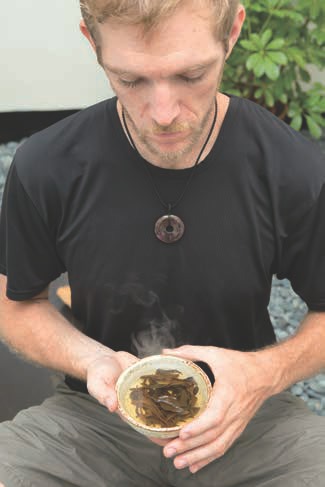
With these guidelines, we hope you will begin to utilize Tea for Qi cultivation if you haven't already. In doing so, we can appreciate yet another dimension of Tea. And that's important to remember: we aren't suggesting that Qi is more enjoyable than other aspects of Tea, like flavor, aroma or mouthfeel, but rather that without it, your experience of a Tea is incomplete. Furthermore, Qi cultivation plays a large role in what makes Tea a Dao, a Way, for it is through this that we find connection to the Universe around us, our inner Stillness and each other as well.
